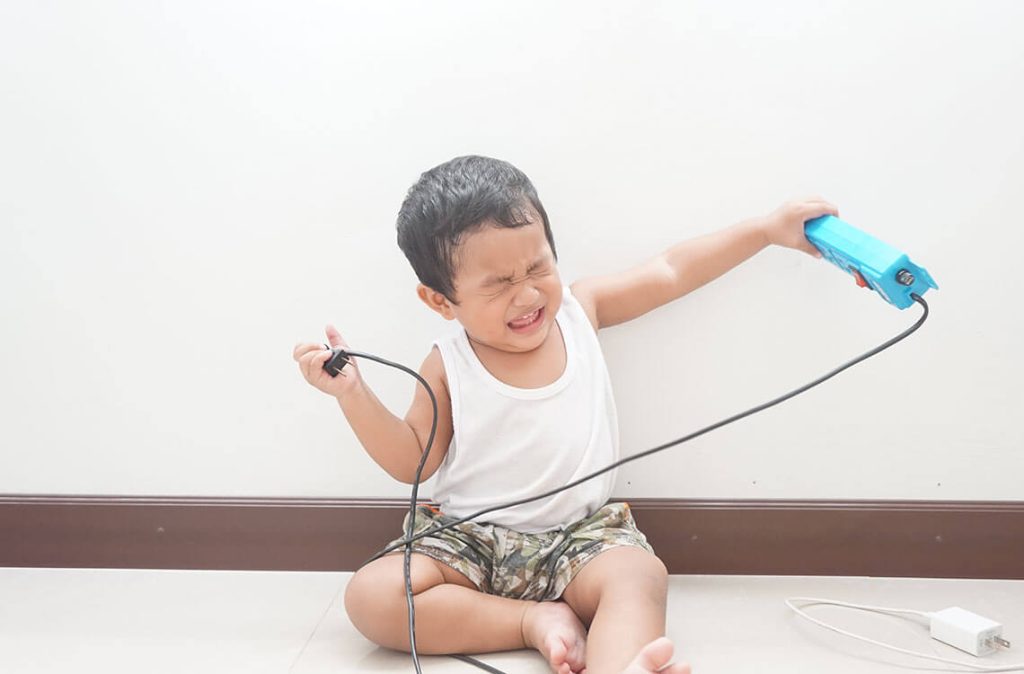We’d like to think that our homes are safe havens where no dangers exist.
But that is far from the case.
Why else are new parents are encouraged to babyproof their house when bringing a newborn back home?
If you have small kids, it’s even more important to protect them from the unsuspecting threats that lurk in and around your abode.
While there are too many to cover in a single article, we’ll be looking at one of the more obvious dangers that you need to watch out for: Electricity.
We use electricity almost every day in our homes, it’s basically a necessity.
But it also poses a significant risk to younger kids if they don’t know the safety protocols.
Here are some tips on teaching your children about electrical safety at home.
Electrical Safety Tips for Kids
Do Not Touch
Sometimes kids can be curious about their surroundings. And power sockets can often be objects of fascination.
So, you have to warn them not to touch any power sockets, or electronic appliance for that matter.
Similarly, you shouldn’t have any power outlets in the bathroom either. This is a frequently overlooked danger.
While not many Malaysian homes have this feature, some unfortunately do; especially near the sink where mums can plug in and use their hairdryers.
If this is the case, then you need to move your personal grooming appliances away from water sources. For your safety and your children’s.
It’s also a good idea to keep appliances out of reach of children and to tuck away any stray cords so they don’t trip over them.
You should also remind your kids not to stick their fingers or anything else into power sockets.
Beware of Water
Probably one of the deadliest things about electricity is that it can be conducted via water.
So, it’s important to remind your kids to be wary of this fact.
For instance, they shouldn’t be touching power sockets or electronic appliances with wet hands. Even with the plug switched off.
Again, as a parent you’ll need to reassess your home.
The kitchen for instance poses a secondary electrical hazard zone, much more than the bathroom.
You should ideally not put any electrical appliance near the sink where there it is constantly exposed to water.
Your kids may endanger themselves if they want to wash their hands and there’s a toaster nearby.
Use Red Tape
Another good trick to keep your kids safe is to use some good old red tape.
Walk around the house with your kids and mark off sockets, areas and appliances that are off-limits to them.
Remind your kids that where ever you’ve put the red tape has become a no touch zone.
This may not be much a solution if your kids have trouble following rules.
After all, some kids suffer from the ‘forbidden fruit‘ syndrome.
This is whereby the more you prohibit them from doing something, the more they want to do it.
Not out of any disrespect or disobedience, but from the sheer fact that they’re not mature enough yet to know better.
Another downside of this advice is that it may not be the most aesthetically pleasing solution.
So, think of other options besides red tape to designate danger zones in your house.
Lay Down the Basics
Once your kids are a little older and can understand basic instructions you can expand their knowledge of electrical safety.
This is especially important when they eventually start using electric appliances themselves.
So, set some basic ground rules for them to follow.
These rules not only enforce electrical safety in the house, but some of them will also help you cut back on electricity bills.
Here are some good tips you want your kids to remember when using electricity:
- Don’t touch exposed wires
- Pay attention to and obey warning signs
- Don’t play near powerlines
- Always switch off the socket before removing the plug
- Switch off and unplug all appliances when not in use
- Never plug on too many appliances into one extension
- Don’t leave appliances like phones and electronics charging overnight
- Never overcharge devices (always unplug before reaching 100% charge)
- Don’t touch the circuit breaker during power outages
- Switch off and unplug all devices during rain or storm
Electrical Safety for Kids
Electrical accidents happen all the time, in various degrees of severity.
Sometimes they are unavoidable. Faulty wiring, short circuits, lightning.
But this doesn’t mean you can’t reduce the risks.
There are many ways a child can electrocute themselves while you’re not looking.
And they may be far too young to understand proper instructions.
So as part of your babyproofing, consider investing in some socket covers and cable protection.
Especially if you have an infant crawling around on the floor where they may encounter some electrical hazards.
These small things may not be serious to an adult, but again, kids may not know any better.
So, it’s up to you to protect them.
And since you can’t cut off electricity from your home indefinitely, the next best thing is to simply make some small modifications to your house.
Hopefully, as your kids mature and grow older, they’ll know what and what not to do when handling electrical items.
And it will all be thanks to your patience and perseverance in pointing them in the right direction. You’ve got this, parents!
For more insightful stories and fun recipes, stay tuned to Motherhood Story!
